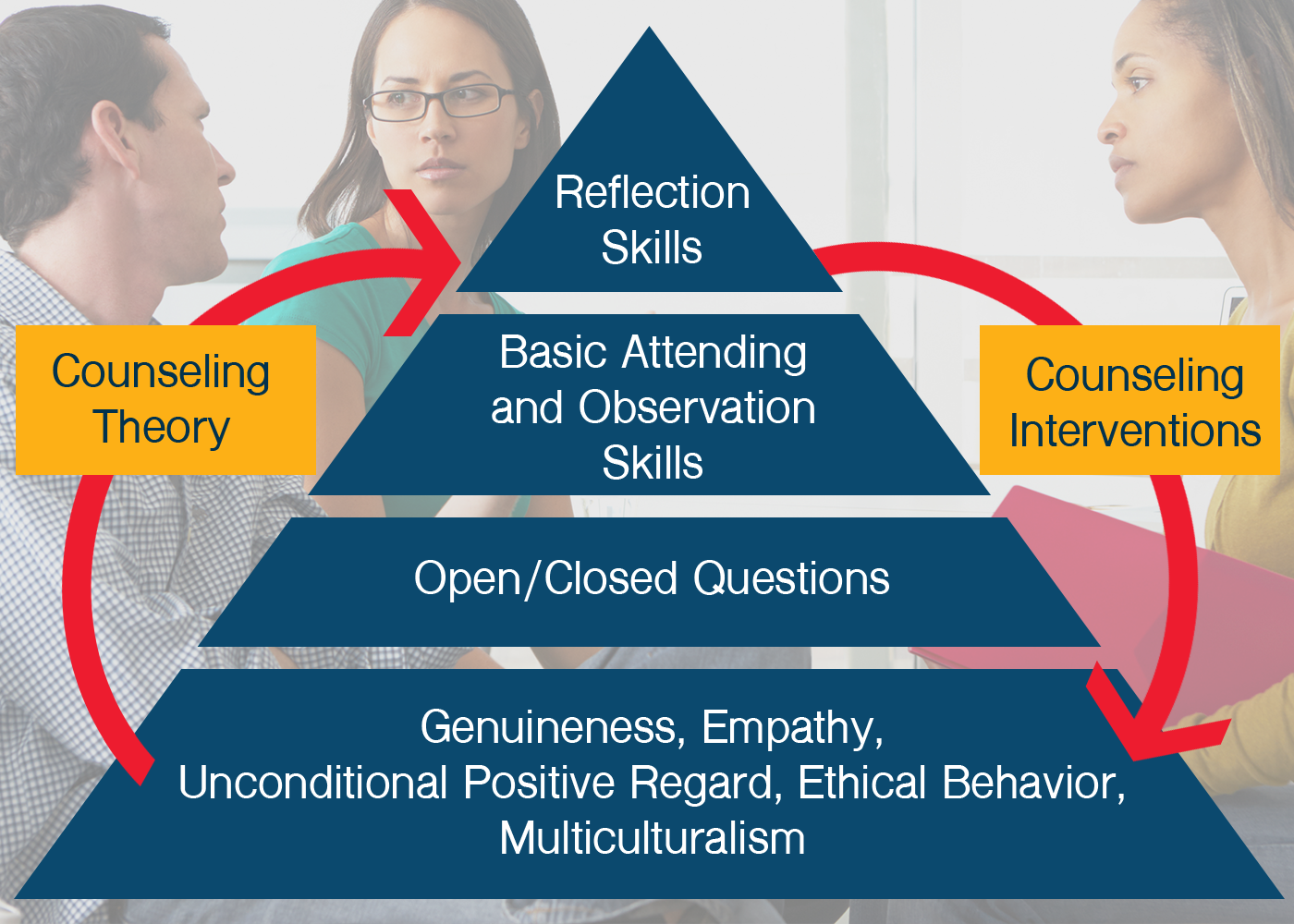Main Content
Module 1: Introduction to the Person and Profession
Counseling Microskills
The counseling microskills are the foundation for being able to work effectively as a helping professional. The microskills, developed by Allen Ivey in 1971 to bridge the gap between theory and practice, help the professional fully hear and understand a person’s story. Effective use of the microskills helps to relay that you are listening and fully engaged in what the person is saying; by using them, you demonstrate empathy, genuineness, and acceptance, creating a safe environment that allows for a healthy therapeutic alliance between you and the individual.
The microskills include a variety of verbal and behavioral responses and the appropriate use of questions, all of which come together to enhance the therapeutic relationship. These skills can be combined in different ways to be used with people from varying backgrounds and in a variety of situations. The microskills are also flexible enough to be used effectively with different counseling theories.

The microskills are often presented in a hierarchy (Ivey, Ivey, & Zalaquett, 2014). At the base of this hierarchy are the necessary personal and professional conditions stated by Carl Rogers (1957), including genuineness, empathy, and unconditional positive regard. Added to this foundation are ethical behavior and multicultural competencies (Ivey et al., 2014). It is important to keep in mind that if these conditions are not met, then the rest of the process will not work.
The hierarchy is only partially complete, as this course will focus mostly on basic attending and observation skills, asking questions, and reflection skills. It will spend some time on two other microskills (self-disclosure and confrontation), but they require much practice, as well as the mastery of the other skills and the personal and professional conditions that go beyond this introductory course. Intertwined throughout the hierarchy are counseling theories and interventions.
Basic Attending Skills
The basic attending skills include eye contact, vocal qualities (such as tone of voice), and verbal tracking. Verbal tracking involves keeping tabs on words or phrases that are emphasized, repeated, or even not used. Also included in basic attending skills is body language. Body language can involve your position or a client’s position in a chair or even a room, body posture, possible mirroring, and even physical barriers, such as a table or desk between you and a client.
Basic Observation Skills
Next are the basic observation skills: paying attention to not only what a client says, but also to how a client says something. For example, perhaps you experience the following situation with a client:
Video Case Scenario 1.2
Video Case Scenario 1.3
Another example would look like this:
While attending and observation skills are called basic skills, they set the stage for the more advanced skills and are necessary to master to be able to use theory and to become a highly effective helping professional. If you do not learn these essential skills, then the more advanced microskills are useless.
Open and Closed Questions
The next set of skills includes open and closed questions. Asking good questions is a primary tool for the helping professional. Well-developed and well-placed questions allow the helping professional to gather pertinent information from the client, allowing the client to be able to tell his or her full story. Good questions also open clients up to self-reflection and to becoming more aware of personal thoughts, actions, attitudes, and values.
Reflection Skills
The basic attending and observation skills and open and closed questions are used to develop the more advanced reflection skills. The reflection skills include a variety of techniques, such as encouraging, paraphrasing, feeling reflection, and summarizing. These skills are important for helping people process their logic and emotions surrounding a particular issue. The reflection skills help the client to develop a rich understanding of the issue and be able to examine the problem at hand in a more objective manner.
References
Ivey, A. E. (1971). Microcounseling. Springfield, IL: Thomas.
Ivey, A. E., Ivey, M. B., & Zalaquett, C. (2014). Intentional interviewing and counseling: Facilitating client development in a multicultural society (8th ed.). Belmont, CA: Brooks/Cole.
